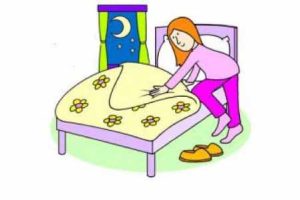I understand that if it is your first time hearing this phrase, you might want to give it a literary interpretation, please don’t. Idioms are random statements usually with connotative meaning to a peculiar group of people.
As an English user, you can rest assured that on this page you will learn about the meaning of ‘hit the hay’ alongside 15 other ways to use similar expressions. Headways!
“Hit the hay” meaning
The phrase “hitting the hay” is an idiomatic expression that means going to bed or going to sleep. It is a casual and colloquial way of referring to the act of lying down on a bed or mattress, usually at the end of the day when one is tired and ready to sleep.
What does the origin of this phrase look like? Back in the 1880s when this phrase was first commonly used, it didn’t describe people going to sleep in general. It originated from the idea of hitting or striking the hay or straw found in old-fashioned beds or mattresses to fluff them up before lying down. Over time, it has become a common and lighthearted way to talk about going to sleep.
Like a few other words, however, this phrase started to change its meaning in the early 1900s – where it denotes sleep in general terms.
There is no special way to use this phrase in everyday speech, as long as you comply with the English basic grammar rules.
15 Similar Phrases to “Hit the Hay”
- Hit the sack
- Sack out
- Turn in
- Kip Down
- Go to sleep
- Crawl In
- Out like a light
- Put to bed
- Sleep tight
- Time to retire
- Fall asleep
- Lie down
- Tuck in
- Catch forty winks
- Sleep time
Hit the sack

Hitting the hay and hitting the sack have a similar origin. Both, as you should have known, refer to going to sleep.
Briefly, here is what you need to know about this idiom. Back in the day, before the kind of bed sheets/linen we use today, linen (bed covers) was often made with sacks.
As a result, hit the hay and hit the sack are phrases that work hand in hand; while people are said to lie in hay, they sometimes get sacks to serve as the bed cover.
Some researchers have reported that hay was stuffed in sacks in those days, now translating to bed and its sheet.
Sack out
To sack out is to go to sleep. The meaning of this phrase remains unaltered regardless of where one sleeps.
Remember that owing to the origin of the initially considered phrase, one will in a sense restrict it to sleep on the bed.
Turn in
Of all that will be considered on this page, turn in is a more liberal and general statement. For the purpose of our study here, it means to go to sleep.
It has several other meanings other than this, but let us be less concerned with that.
Turn in as another idiom for going to sleep, is not something you want to be fond of using, because of its ambiguous nature.
To lessen the ambiguity in this phrase, you can always attach it to ‘to sleep/bed’. So you say ‘I will soon turn in to sleep’. Turn in may not be a phrase commonly used in this sense, but its first use dates as far back to the late 1690s.
Kip Down
Having its origin straight from Britain, this phrase has a number of closely related interpretations. Before going to consider the phrase as a whole, let’s see the key word in it; Kip. To kip is to sleep.
You’d hear native speakers say, ‘I will be home to kip for a few hours.’ In the U.K., additionally, Kip may also take the place of such words as nap.
Therefore, the coming together of Kip and down sum up to: ‘going to sleep’, ‘preparing to sleep,’ ‘going to bed,’ ‘sleeping outside one’s home’, etc. – acts that eventually end as sleep. Bed down is one very close synonym to this English slang.
Go to sleep
You may not easily notice that this could also be a substitute for hitting the hay if it doesn’t make it to this list. It is what other phrases translate to be.
As a matter of fact, this may stand as a sentence, if it is counted as an imperative statement, where subjects are not essential.
It wouldn’t sound natural to many if you tell them, “you go to sleep”, so “go to sleep” expresses the same thought.
Consequent upon which we shall keep it simply as an idiom and not a phrase.
You are not new to hearing ‘go to sleep’, it is a statement you don’t specially learn to use. You can always make it replace ‘hit the hay’.
Crawl In
One thing you’d notice if you take time to observe idioms is that they are often suggestive of their meanings. We earlier considered the phrase ‘turn in’, and this is not so much different from it.
After a long day working in your office, you don’t open your eyes to see that you are in bed. You walk into it. The action of walking in, is what is modified ‘crawl in’.
When one prepares to sleep and lie in bed, we say they crawl in. On the other hand, rising from bed is crawling out, as is the case with ‘turning in’.
Out like a light
This is quite nonequivalent to other phrases earlier examined herein, but it has a meaning that comes very close to going to sleep.

To go out like a light is to fall asleep almost suddenly. It is not so common for people to snap out of their immediate world suddenly, but it is no news that some people fall asleep almost suddenly.
This is usually a lifestyle because it is peculiar to some people. It could also be a result of stress and the like.
“Before we know it, he had gone out like a light,” could equally be said as “…he had hit the hay.” Both phrases can work as one in certain contexts.
Put to bed
This is especially the right choice of word for you when referring to a child. Not all children hit the hay by themselves, so with your assistance, you have put someone to bed.
You don’t have false knowledge if you originally know this to be one idiom for ‘child delivery.’ All you want to know now is that it doesn’t end there.
You can take this as its metaphoric implication, and ‘putting in bed to sleep’ as a literary interpretation of the phrase.
To avoid confusion, some hyphenate these words to imply their literary meaning and leave it separated for a connotative one. By the way, I think it is a good idea to buy.
Sleep tight
All right, so this may be the goodbye words you get from your girlfriend/boyfriend every night as you go to sleep, but it has to make it to this list.
Perhaps, you never bothered to research what this statement means—I have got you here.
Simply, to sleep tight is to sleep well. Some may argue it can’t take the place of hitting the hay, but it is even a kinder way to say ‘hit the hay’. Your lover doesn’t want to hear you say ‘sleep!’ he/she wants to hear ‘sleep well!’
This phrase’s origin can be traced back to the medieval period where ropes (instead of springs) were to be tightly tied under the bed for better sleep.
Time to retire
I know the first thing a non-native speaker of English is more likely to think of upon hearing this. But you’ve got no career involved in this, anyway. Just you and maybe your mattress.
To different people, this phrase may have a different meaning, but owing to context, it will always go around what you intend them to know. Not even the unpracticed user of English will misunderstand you when you use this phrase correctly.
In its crude form, this could imply ‘having to rest,’ ‘going to sleep/bed’, as well as ‘returning home.’
Fall asleep
This too is a substitute for ‘hit the hay,’ but it appears to be more unspecific. Contrary to the major phrase in consideration, this doesn’t hint you on where one sleeps.
Whether dizzy spells get them to be half-asleep while standing or so, you can’t tell, you are just told that they slept. Whenever you want to keep it a bit vague, this is your go-to phrase.
In “I didn’t hit the hay before falling asleep last night,” readers will understand that the writer slept (maybe a bit), but didn’t crawl into bed.
In another sentence like, “Oh, he has fallen asleep, I didn’t know when he hit the hay,” both phrases carry the same meaning.
Lie down
Take this as a bonus: it is ungrammatical to say you lay down, we say ‘lie down.’ It’s one commonly asked question, by the way. By lie-down, one is referring to sleep (especially a short one).
Practically, people may fall asleep minutes after lying down comfortably (even when they don’t plan to), not until they come in contact with any hay.
And mind you, hay is needed for a long sleep, so this is the logic behind lying down as a phrase for short sleep/rest. This phrase is more peculiar to British.
Tuck in
Tuck in has some other meaning, but it is also a good synonym for ‘put to bed’. Anyway, these are the two phrases I have set aside for nursing mothers or others who put people, especially children, to sleep in bed.
When you tuck in, you put someone to sleep, by making them feel comfortable in bed, pulling bed covers around them.
Catch forty winks
Not even a native speaker is safe from the trick you can perform with phrases like this. If the need ever be that you want to sound more natural and practiced, there is about a fifty percent chance you’d send the receiver to browse the internet for an interpretation when you say this; it is not a commonly used idiom.
“You know what? I’ll have to catch forty winks before we meet.” And the receiver of your message is lost. He’ll be like: “What winks is dude talking about?” Confused!
He might know what it means though, but at least you aren’t sounding like the other two hundred people he has spoken to in the last few months.
Sleep time

And here comes the alternative that needs no campaign. It’s about time I hit the hay, which means it is almost sleep time. This is very much a two-word to explain several other phrases on our list.
It is that one statement you shouldn’t forget when you can’t remember ‘hit the hay’ and/or all others. It is also just fine as ‘time to sleep’.
You have seen the several ways in which we make every phrase on our list fit in as a good substitute for ‘hit the hay’, consequent upon which you’re reassured you have just read the right piece.
So, as is the case with some other English words in the modern age, ‘hit the hay’ can cut across two meanings: advancing to bed, and going to sleep.
But be free to use this phrase, as every user can determine which of these he is referring to.